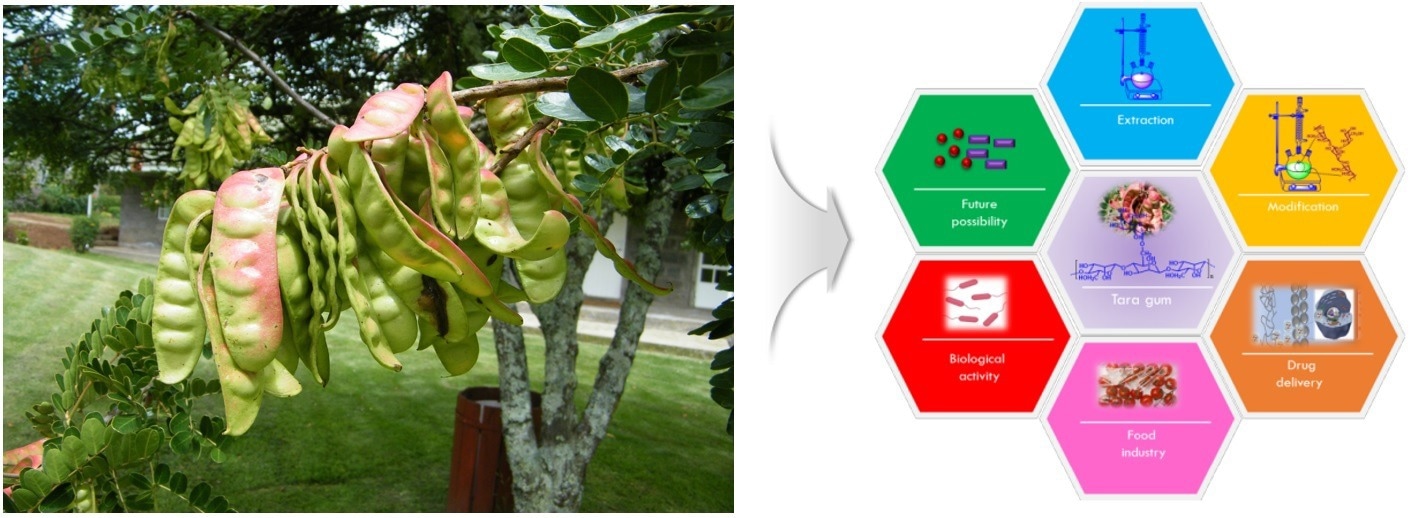Tara gum, a natural, water-soluble substance, is a sustainable and biodegradable substitute for synthetic plastic in applications like packaging, edible films, and coatings. In a recent study, researchers explored modification methods to enhance tara gum's functionality, as well as the application of its modified forms in food and drugs. Emphasizing its potential to reduce environmental impact, the study underscores tara gum as a key player in advancing green solutions across various industries.
 Researchers Review the Application of Tara Gum and Its Modified Forms as a Sustainable and Biodegradable Polymer in Food and Drug Industries. Image Credit: Scamperdale from flickr (https://www.flickr.com/photos/36517976@N06/6363740405) and Sangkil Lee from CAU
Researchers Review the Application of Tara Gum and Its Modified Forms as a Sustainable and Biodegradable Polymer in Food and Drug Industries. Image Credit: Scamperdale from flickr (https://www.flickr.com/photos/36517976@N06/6363740405) and Sangkil Lee from CAU
Synthetic, non-biodegradable plastics are major sources of environmental pollution and have prompted a rising interest in sustainable, biodegradable alternatives derived from natural polymers. “Tara gum,” derived from the seeds of the tara tree (Caesalpinia spinosa), stands out as a promising solution. This natural, water-soluble substance contains polysaccharides (complex carbohydrates), including the widely used “galactomannan,” which is employed in coatings, edible films, and as a stabilizer and thickener. The biocompatibility, biodegradability, and safety of tara gum also make it valuable in industries like food and drug delivery. Moreover, the adaptable nature of the groups within tara gum polysaccharides renders it valuable for tailoring physicochemical and mechanical properties for specific applications.
In a recent study, made available online on 29 September 2023 and to be published in Volume 323 of Carbohydrate Polymers on 1 January 2024, a team of researchers, led by Professor Sangkil Lee from Chung-Ang University in the Republic of Korea, has now conducted a thorough and critical examination of modification methods (“grafting”) applied to tara gum. The study explores the applications of these modifications in the food and drug industry, including the development of pH-sensitive food packaging and drug delivery systems.
Prof. Lee explains: “Our team has a keen interest in natural polysaccharides and their role in drug delivery, and we have been working on tara gum and other natural polysaccharides to extend their applications. Various researchers have explored the wide range of applications for its various modified forms. However, this is the first review article on recent advancements in tara gum and its modified materials, and their potential role in food and drug delivery.”
The team presents a systematic and detailed overview of various advancements in tara gum research. They describe methods for the extraction, isolation, and characterization of tara gum polysaccharides. Additionally, the toxicology and rheological (deformation) behavior of tara gum, along with its behavior in the presence of other polysaccharides, are thoroughly examined.
The review paper also delves into the applications of tara gum and its modified derivatives in the food industry. These include the use in biopolymer packaging, monitoring seafood and milk spoilage, acting as a gelation agent, providing short-term protection of food from oxidation, and safeguarding fatty foods. The applications of tara gum and its modified materials have been detailed for the pharmaceutical industry as well, including the controlled-release of vitamin D-3, antibacterial hydrogel development, iron delivery in both infants and adults, controlled-release of drugs, and restoration of the physiological barrier of the gut.
“The physicochemical property of tara gum and its products can be enhanced using various kinds of monomers, crosslinkers, or other polysaccharides. Furthermore, the improvement of antibacterial properties might be achieved through the incorporation of chitosan or other natural polymers, as well as inorganic materials such as copper and zinc nanoparticles,” speculates Prof. Lee.
The study could thus inspire the scientific community to research further on tara gum for the development of various food-related applications as well as effective and safe drug formulations to reduce the global burden of health risks and costs.